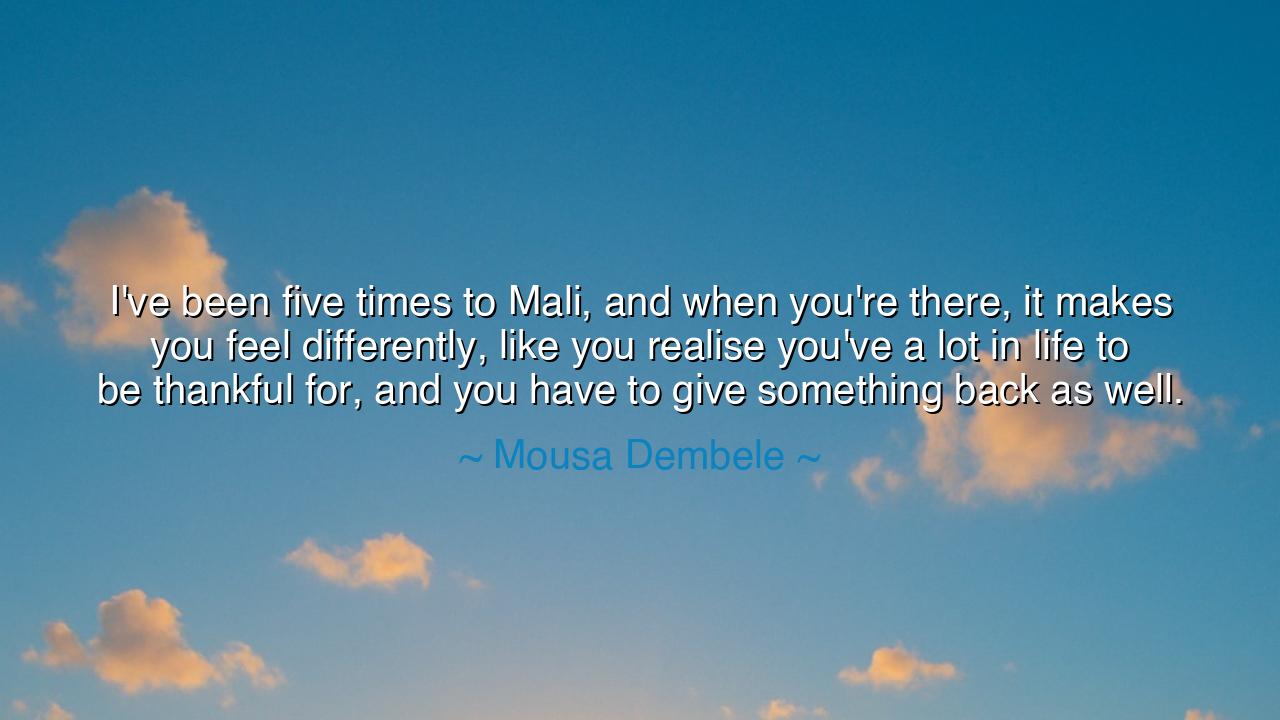
I've been five times to Mali, and when you're there, it makes
I've been five times to Mali, and when you're there, it makes you feel differently, like you realise you've a lot in life to be thankful for, and you have to give something back as well.






When Mousa Dembélé proclaims, “I’ve been five times to Mali, and when you’re there, it makes you feel differently, like you realise you’ve a lot in life to be thankful for, and you have to give something back as well,” he speaks with the voice of one who has stood between two worlds. On one side lies the abundance and comfort that modern life can provide; on the other, the stark reality of hardship that millions endure each day. His words carry the weight of humility, for in witnessing the struggles of others, he has discovered the true measure of gratitude and the sacred duty of giving back.
The essence of his reflection lies in the confrontation with perspective. Many of us, surrounded by conveniences, grow blind to the richness of what we possess: clean water, shelter, daily bread, and the freedom to pursue our dreams. Yet when Dembélé traveled to Mali, he saw lives shaped by scarcity, by daily battles for the simplest of needs. That vision pierced the veil of complacency, awakening in him not only thankfulness but a calling to share his own blessings. True wisdom, he reminds us, comes when one’s eyes are opened to realities beyond their own.
History provides us with many echoes of this truth. Consider Albert Schweitzer, who left behind the comforts of Europe to serve in Africa, building hospitals and offering his skill as a physician. Or think of Mother Teresa, who walked among the poorest of the poor in Calcutta, finding in their suffering the seed of her mission. Both, like Dembélé, understood that to see suffering is to be summoned—not to pity alone, but to responsibility. The gift of sight demands the gift of action.
Dembélé’s gratitude is not empty sentiment. He says, “you have to give something back.” This is the heart of his wisdom: gratitude must flow outward. It is not enough to say, “I am lucky.” One must ask, “How can I use my fortune to lift another?” Gratitude without generosity becomes stagnant, but gratitude expressed through giving becomes a living river that nourishes all it touches. To be thankful is the beginning; to give back is the fulfillment.
There is also great humility in his recognition. Though he is an athlete of global renown, celebrated in Europe’s stadiums, he bows before the reality of lives less privileged. He understands that his success is not solely his own doing but also the fruit of opportunities and circumstances denied to many. In acknowledging this, he breaks the illusion of self-sufficiency and enters the realm of true greatness, where wealth and fame are not shields, but tools of service.
The lesson for us all is clear: seek out perspective. Do not confine your life to the circle of your own comfort. Travel, listen, observe, and immerse yourself in the lives of those who have less. Let what you witness awaken in you both thankfulness and compassion. And then, do not stop at feeling—act. Share what you have, whether it be time, wealth, knowledge, or love. For only then does gratitude become complete.
So I say to you, children of tomorrow: remember Mousa Dembélé’s words. Be ever thankful for the abundance in your life, but let your thankfulness be proven in deeds. Do not hoard your blessings as though they were your own alone, but pour them out, as rain waters the earth. In this way, gratitude will not only dwell within you—it will spread beyond you, lighting the path for generations yet to come.






AAdministratorAdministrator
Welcome, honored guests. Please leave a comment, we will respond soon